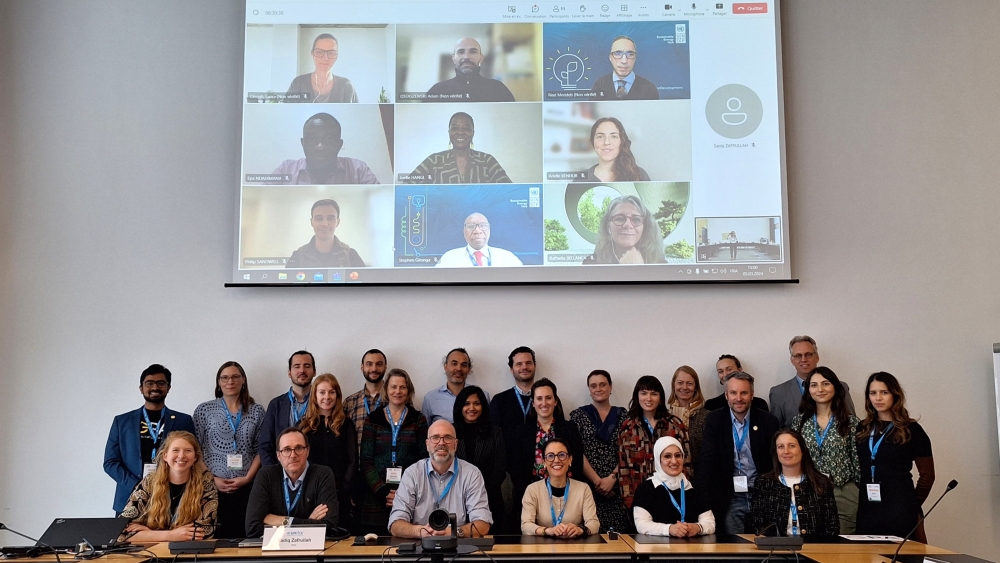In this section
In this sectionThe Annual GPA Steering Group (SG) meeting was held on 5th March 2024 in Geneva, Switzerland, with the participation of 16 member organisations convening in person for the first time since 2019 to deliberate the progress, persisting challenges and future of humanitarian energy. With an impressive array of attendees, both in-person and online, the meeting underscored significant collaborations across members, advances in sustainable delivery of energy through equitable market-based energy access programming, and critical growth in the number of experts in the field and ongoing projects.
The meeting highlighted significant progress and ongoing challenges in providing sustainable energy for displaced people around the world, emphasising the need for a significant scale-up in expertise and funding to build long-term energy programmes, more focus on mainstreaming clean energy into the humanitarian cluster system, greater prioritisation of the topic within host and donor governments, and more progress on meaningful participation and inclusivity. The participants highlighted that the joint focus should be on securing more funding and financing for end-to-end energy access support, tapping into climate adaptation funds, scaling humanitarian energy transitions, and enhancing participation of displaced communities in decision-making to achieve SDG7 ambitions by 2030.
The discussions throughout the meeting portrayed the evolution and achievements in mainstreaming sustainable energy access and decarbonisation into humanitarian responses over the past five years. It is clear that considerable progress has been made through the prioritisation of energy access through solar solutions and clean cooking interventions. However, the meeting also shed light on the persisting challenges such as adapting to climate change impacts, dwindling humanitarian funds, and ensuring scalability of initiatives. Reflections on the GPA emphasised the critical need for continuous advocacy, partnership development, and a collaborative rather than competitive approach to further propel the sector forward.
Furthermore, the Steering Group focused on a collective impact visioning exercise to lay a strategic plan for sustainable energy in forced displacement contexts, initiating a joint roadmap for the sector until 2030. Through breakout sessions, the groups delved into discussions on scaling humanitarian energy transitions at the country level, attracting a diversified mix of funding, and fostering sector-wide analysis and research to influence policy, financing and partnerships. This forward-looking approach not only aligns with the global agenda but also with the Sustainable Development Goals (SDGs), particularly SDG 7 on affordable and clean energy.
As we look towards the future, the key action points outlined during the meeting serve as a pathway for the humanitarian energy sector's journey towards 2030. These include:
- Ensuring significant funding flows into energy access in displacement contexts by mapping out funders and financiers and tracking progress.
- Tapping into climate adaptation funding to link energy access with job creation, resilience, local economic development, and livelihoods.
- Scaling up humanitarian energy transitions at the country level, aiming for a significant reduction in diesel generator use through solarisation.
- Convening multi-stakeholder workshops and resource mobilisation processes for scaling best practices and ongoing programmes.
- Enhancing meaningful participation by creating mechanisms for people with displaced backgrounds to be involved in strategic decision-making.
- Delivering foundational research to develop new public-private partnerships for sustained delivery of clean energy solutions in forced displacement contexts.
These action points not only embody the collective vision of the GPA Steering Group but also underscore the importance of innovation, collaboration, and strategic planning in overcoming barriers to energy access in displacement settings. The commitment and unity displayed at the 2024 Annual GPA SG Meeting inspire confidence in the sector's ability to create a more sustainable and inclusive future and will be followed by a 5-year roadmap for all stakeholders to convene and collaborate around leading up to 2030.
Last updated: 22/05/2024





